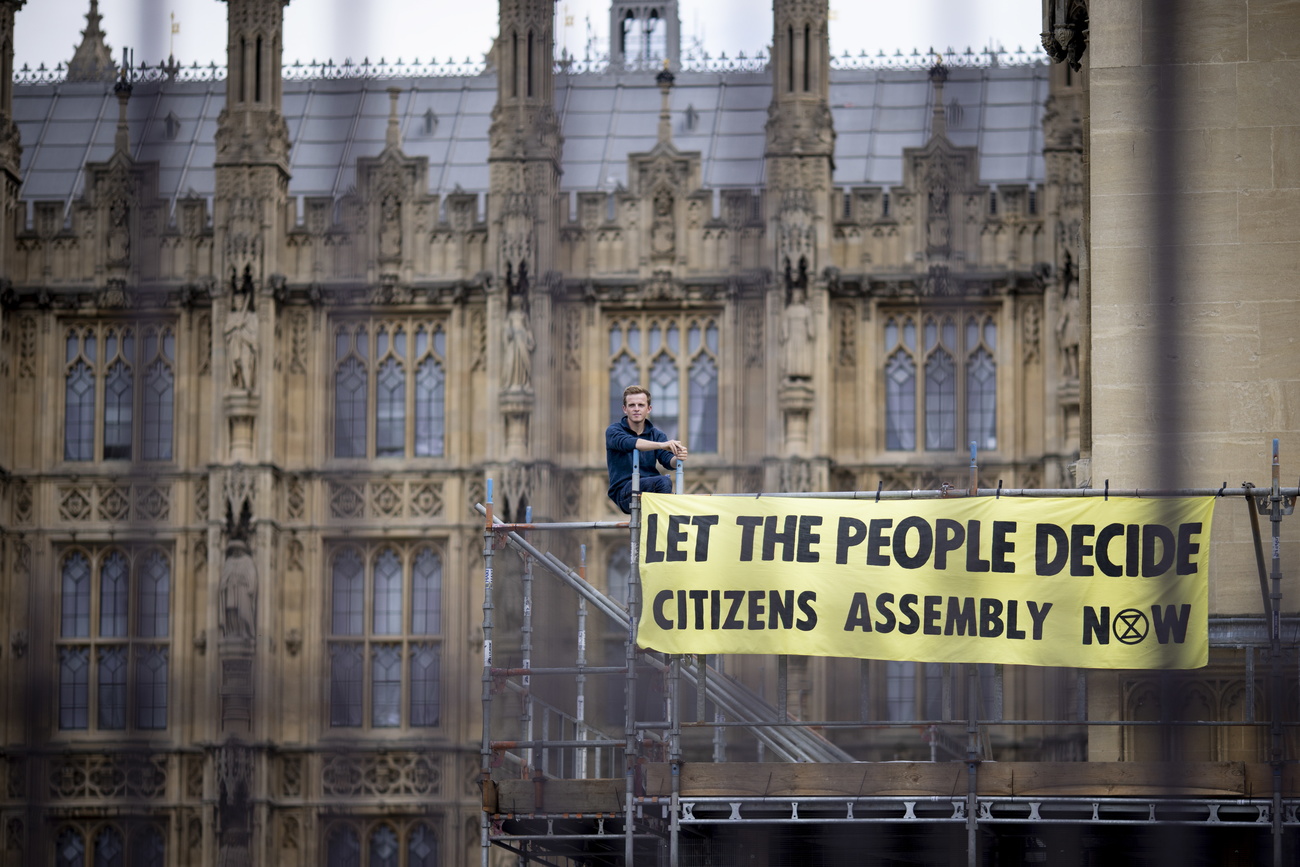
What role can citizens’ assemblies play in solving the climate crisis?

Political scientist Rikki Dean has done research on climate assemblies. In his opinion, democracies are struggling to cope with global warming with these citizen panels alone.
SWI swissinfo.ch: You will be on a panel at the Aarau Democracy DaysExternal link on Thursday about “Less or more democracy in tackling climate change?”. Is there an argument for less democracy?
Rikki Dean: In my opinion there is no good argument for less democracy, but there is a threat of eco-totalitarianism in relation to climate change. Even in democratic countries we often suspend normal democratic processes in an emergency situation. We saw this happen in the pandemic.
China in particular provides a model for non-democratic governance that some people find attractive. So this question is a real one: Will we reduce our emissions within our democratic governance or will Europe shift in a more authoritarian direction in its politics? So thinking about how we can do climate policy better from a democratic perspective is important.

SWI: Do authoritarian countries handle climate change better?
R.D.: No, definitely not. But our representative institutions are failing to deal with this problem. Parties still campaign on the basis that good government is about delivering economic growth and consumption can grow endlessly – even though we know this is destroying the environment. Representative politics has not faced up to the major political economic problem of the next few years: How do we create the democratic legitimacy to change our way of life so that it respects ecological limits?

More
How democracy features in local Chinese politics
SWI: Some put their hope in citizens’ assemblies, deliberative mini-publics, the participatory democratic cases you are studying. Why is there hype about these assemblies?
R.D.: A lot of it started from how the results of the Irish Constitutional ConventionExternal link were interpreted around Europe. The citizens’ assembly decided after deliberation that gay marriage and abortion laws should be liberalised. Both decisions then went to a referendum. Those came back in favour of the citizens’ assembly’s recommendations. This liberal outcome in a majority Catholic country occurred around the same time as Donald Trump and Brexit. This inspired a lot of people, so deliberative assemblies became the new hope for addressing problems of polarisation.
But – a substantial minority still voted to oppose liberalisation. More plausible is that the majority’s opinion had already shifted and the political parties just didn’t change their stance because there was still a large block of conservative, religious voters whose votes they didn’t want to lose. The assembly and referendum managed to unblock the political system, updating the law in line with majority opinion. This is actually very useful, but it’s not what has made citizens’ assemblies so popular. They are seen as a solution to the big problems of representative politics, like populism and polarisation, even if this is not a convincing interpretation of what happened in Ireland.
More
SWI: You formed part of a studyExternal link that compared the first six national climate assemblies in France, Germany, the UK, Scotland, Ireland and Denmark. What did you learn?
R.D.: We challenged the idea of what successful impact means for a citizens’ assembly. There is a widespread idea that deliberative mini-publics have only had a successful impact if they directly change policy-making outcomes.
It’s a logical way to think about it, but it’s based on a fantasy idea of politics. Policy making and administration are long, complex processes with various stakeholders having an influence. To organise one event that produces recommendations that changes everything is not how politics works. We need to be more realistic about the potential impacts of deliberative mini-publics.
Though we tend to talk about the climate assemblies as if they are all the same, we found the six cases are integrated into the political system in very different ways. The Danish assembly, for instance, was organised by a ministry and is not very different from an ordinary consultation process, so it’s strange to treat it differently from other consultations. We don’t usually have the expectation that such consultations transform public debate; we don’t think they’re a failure if they don’t. The German assembly, on the other hand, wasn’t organised by government, but by civil society. It’s unreasonable to expect that such civil society initiatives have a big impact on government policy making.
SWI: In SwitzerlandExternal link Extinction Rebellion asked for citizen’s assemblies. Why do activist groups ask for deliberation processes?
R.D.: Extinction Rebellion obviously already has a clear idea what turn climate policy should take. So why do these groups want to organize a citizens’ assembly? I think it’s an attempt to change the politics of the situation, though they may disagree with me. If you are Extinction Rebellion, campaigning for a firm direction on climate policy, one argument the government can dismiss you with is: you are just a radical minority, you don’t speak for the public. But if you organise an assembly of randomly selected citizens, which deliberates and wants the same as you – it’s harder for institutions to say that the public would never support your aims.
SWI: This sounds more like political campaigning than democratic innovation.
R.D.: This is interesting. Is this an acceptable use of citizen assembly? Participants are not told: come along, give us your judgement and we will use that in our campaigning activities. But then again the same likely happens with government-initiated deliberation. We only miss it because we assume government has a unified opinion. However, governments are full of people who disagree with each other. At least part of the motivation of politicians and policy officials to organise citizens’ assemblies is likely the urge to win political battles within institutions. There is evidence that they’re used like this. If they can produce legitimacy for action, then this is quite a useful function to perform. But it’s wrong to pretend that only the power of the better argument determines laws and policies.
The Centre for Democracy Aarau (ZDA) is organising the Aarau Democracy Days 2023 for the 15th time.
Despite its name, the one-day programme on March 30 will focus on the topic of “Climate Crisis and Democracy”. For example, law professor Helen Keller will give a lecture on “Courts and the Climate Crisis”.
Assistant Professor Hannah Werner from the ZDA, Andri Heimann from the ZDA, Karin Ingold, professor of Environmental Policy at the University of Bern, and Rikki Dean will discuss “Less or more democracy in tackling climate change?”?
SWI: Activists also think global warming as an issue is too complex for our systems as they are and citizens’ assemblies for them seem to be a chance to change that.
R.D.: I am sceptical of using mini-publics to produce a long list of recommendations on a complex topic. I think there are two problems with it. The strength of a mini-public is that people engage deeply with a topic. But the more issues you discuss, the less time you have for each one. Also, a long list of recommendations makes it easy for politicians to just cherry-pick the easiest, least radical ones to implement and say that they have acted.
I would prefer mini-publics to solve a specific problem. “Overcome the problems of our political system” is neither a very clear goal nor a realistic ambition. All the most successful citizens’ assemblies have been ones that made a judgement on a specific thing. A question like “How do we reach net zero?” is too complex and is actually many questions across many diverse topics. A better question for an assembly would be “Should we ban private jets?”
SWI: There are also citizens’ assemblies in Switzerland. Are deliberative elements useful when you already have that many popular votes?
R.D.: I’m no expert on the Swiss system but I mainly see popular votes and mini-publics as complementary. Popular votes need a deliberative basis. Votes should be based on good arguments and mini-publics can help with that. This was a big problem of the Brexit referendum. Even my apolitical family and friends thought it was important to vote, but they kept telling me that they couldn’t find good information. If someone told them: here, 150 randomly selected people argued about that and came to these conclusions, then this would have given them a trustworthy source of information. A good example of this kind of process is the Citizens’ Initiative ReviewExternal link used in Oregon. That could potentially be a good way to combine deliberation with Swiss direct democracy.
Popular votes are also good for scaling-up deliberation. The most effective mini-publics were combined with a referendum. There’s a lot of evidence that mini-publics have a transformative effect on those involved, but we’re usually talking of around 150 people, so not enough to change society. Popular votes give a reason for the media to report about the deliberation and for the public to become interested. So they are essential in promoting the deliberation throughout broader society.
SWI: Are you going to continue studying these mini-panels, or are there other instruments of democratic innovations that could help tackle climate change?
R.D.: I wish I had a good answer. I’m certain that mini-publics are not a silver bullet that will solve all our problems. They are a helpful tool, but we have an unhealthy relationship to the environment embedded in our representative politics. We need to change that relationship. There will be huge resistance to that change. From very wealthy people, but also from ordinary people who have, for example, got used to flying regularly. In rich countries we have all got used to living in an unsustainable way. Changing this requires a broad process of transformation. Citizen assemblies can be a useful part of that, but will likely only be a small part.
Edited by David Eugster

More
What’s a people’s or citizens’ initiative?

In compliance with the JTI standards
More: SWI swissinfo.ch certified by the Journalism Trust Initiative






























You can find an overview of ongoing debates with our journalists here . Please join us!
If you want to start a conversation about a topic raised in this article or want to report factual errors, email us at english@swissinfo.ch.